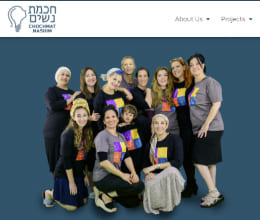Originally printed in The Jerusalem Post, In Jerusalem, March 25, 2016
For as long as the mitzvah of Taharat Hamishpacha has been practiced, it has been the purview of women. A woman counts her monthly cycle, anticipates it, recognizes that it has begun, and separates from her husband until she has counted seven “clean days,” and immerses in a mikve.
Immersion in a mikve is the culmination of the tahara/purity process. A mikve can be an open body of water or, as it is in modern times, a collection of rain and tap water in a designated space. In whatever form the mikve took, it has always been a sacred space for women where they connected with themselves, with their hopes for their family, and with God.
Jewish sources that mention an escort for the woman immersing cite two reasons. The first is safety; mikvaot have only recently been housed in warm buildings with good lighting and safe access. The second is to ensure that all of the immersing woman’s hair is covered by the mikve waters. Note, however, that the Shulchan Aruch provides for a woman who is immersing alone: she can put on a hairnet of some kind to ensure that all hair, together with her body is encompassed by the mikve waters. In both cases, the attendant is present to assist the immersing woman, not to check her. The attendant – who can be a girl of 12 and a day, is meant to assist the woman with whatever she needs, if she chooses, not to tell the woman what she needs to do. This distinction is critical and at the crux of the storm surrounding mikve.
Today, unless visiting an open body of water, every mikvah visit includes having a woman present- a balanit or attendant. The job has expanded, however, to where the balanit now gives guidance, and ensures that the woman’s immersion is “kosher.” Especially as non-observant women are forced to go to the mikveh as a prerequisite to getting married in Israel, the attendant’s role has become more of a ‘checker’ by asking questions about a woman’s preparations, examining her body for possible impediments to the water — and have become more intrusive as Haredi elements took over the service. What started as a way to help women perform their mitzvah as they saw fit has turned into an overbearing obstacle that is alienating women from the mitzvah and even from Judaism.
“In the US, mikvah was…something between me and God. It was my time, my space. The attendant allowed me prepare and immerse as I wished. If I felt unsure …I would ask her advice. Otherwise she gave me privacy until I was in the water. When I immersed, she simply said ‘kasher’, or let me know if I had to repeat. But, mikvah hasn’t been ‘mine’ in a long time. It has come to symbolize everything that has gone wrong with religion and state here [in Israel]. The experience used to be spiritually uplifting, exciting, and personal, it is now anxiety-ridden, filled with resentment, and leaves me wondering how strictly I’ll be questioned. I just want it over as soon as possible, which makes me sadder than anything else.”
These sentiments are being heard more and more often from religious and traditional women in Israel. For some, invasive questioning became a monthly battle: about religious observance; unwanted touching (one woman spoke of the attendant touching her breasts to ‘check for dried milk’); and overly strict requirements, even beyond the rulings of a woman’s own rabbi (such as nail length, piercings). Some women, especially those who have endured sexual trauma, simply don’t want a stranger seeing them naked; they would rather bring a friend or immerse on their own, but neither is allowed in Israel.
It has gotten to the point that many women have given up mikvah. They simply cannot bear what it has become any longer.
In 2014, ITIM, the organization that advocates on behalf of the Jewish people in face of the religious bureaucracy saw a huge win for women, securing new regulations that enabled them to immerse without being cross examined. Then it seemed ITIM was making further progress on behalf of women using the mikveh, when, in Dec 2015, they filed a lawsuit on behalf of 13 women who wanted to immerse without using an attendant at all.
Naava Shafner, a litigant in the lawsuit explains, “I brought the suit because I have had some terrible mikve experiences– including the many times the balanit just pulled my towel off and checked me without asking. As a survivor of sexual abuse, the mikve is an especially vulnerable place for me. But the real reason I brought it, is because of a good experience — when the Balanit finally asked me “do you want me to check you”, that was when the responsibility for my immersion was put on me, and I had a wonderful real spiritual time and I realized that every woman deserves that.”
 But ITIM’s victories on behalf of mikveh-goers may soon become moot. Recent legislation proposed by United Torah Judaism MK Moshe Gafni states that mikvaot can only be used according to halacha as defined by the Shulchan Aruch — as interpreted by the Chief Rabbinate specifically. The bill is mainly an attempt to prevent Conservative and Reform conversions in state-owned mikvaot, but it will be religious women who pay the highest penalty. Passing its first reading in the Knesset, MK Gafni’s law completely eradicates any autonomy women regained in the 2014 legislation.
But ITIM’s victories on behalf of mikveh-goers may soon become moot. Recent legislation proposed by United Torah Judaism MK Moshe Gafni states that mikvaot can only be used according to halacha as defined by the Shulchan Aruch — as interpreted by the Chief Rabbinate specifically. The bill is mainly an attempt to prevent Conservative and Reform conversions in state-owned mikvaot, but it will be religious women who pay the highest penalty. Passing its first reading in the Knesset, MK Gafni’s law completely eradicates any autonomy women regained in the 2014 legislation.
The irony of MK Gafni’s bill is that it will not prevent Reform and Conservative conversions as he himself knows! “We want to keep situation the way it is, and don’t want to cause any unnecessary tension,” Gafni said, noting that privately-owned baths could be used for non-Orthodox conversion rituals. Why then take the very women who love and honor the mitzvah and remove their rights to do as Jewish women have done for millennia, according to their family customs and rabbinical advice. Is this not causing unnecessary tension?
In the specific Knesset hearing to discuss the rights of women in the mikve, where women and organizations discussed how they felt about the legislation and mikve, Gafni didn’t show. Neither did the religious councils nor the Bayit Yehudi MKs who signed onto Gafni’s bill.
Repeated calls by this writer to Gafni (via the number on the Knesset website) went unanswered. This past week, Attorney-General Avichai Mandelblit was prompted to write a letter to the government stating that the bill runs counter to the Basic Law: Human Dignity and Liberty and is unconstitutional. Yet UTJ MK Menachem Eliezer Moses responded that his party is demanding that Prime Minister Benjamin Netanyahu advance the bill anyway: “The attorney-general isn’t obligated to us in anyway. The person who is obligated to us is the prime minister through the coalition agreement, in which he undertook that there be no changes to the status quo on religion and state.”
Asked how she felt the new legislation would affect women and mikve, Dr. Naomi Marmon Grumet, Founder and Director of the Eden Center, said, “Rabbinic rulings vary from community to community and personal exigencies play a significant role in the halakhic process. The needs of a particular woman at any particular time – infertility, medical or psychological issues, and more – are an important component of the rabbinic rulings which apply to her mikve immersion. Moving mikvaot to the jurisdiction of a single, centralized, bureaucratic rabbinic authority undermines the very nature of the halakhic process. It will mean that more women will have the kinds of experiences which will distance them from mikve and Judaism as a whole.”
To legislate the mikve is to profane it. The mikve has always been a sacred space for women. Each woman’s cycle and body is unique and her immersion is personal and holy. It connects her to her past, her people and her Creator, making it intolerable for mikve to be removed from the hands of women and put into a system where all women are the same, and all their needs can be summed up in directives and rules. Halacha has always trusted women with this vital mitzvah upon which the Jewish family stands, but now, by placing themselves in the mikve, Gafni and the Rabbinate have removed God and left no space for women.


